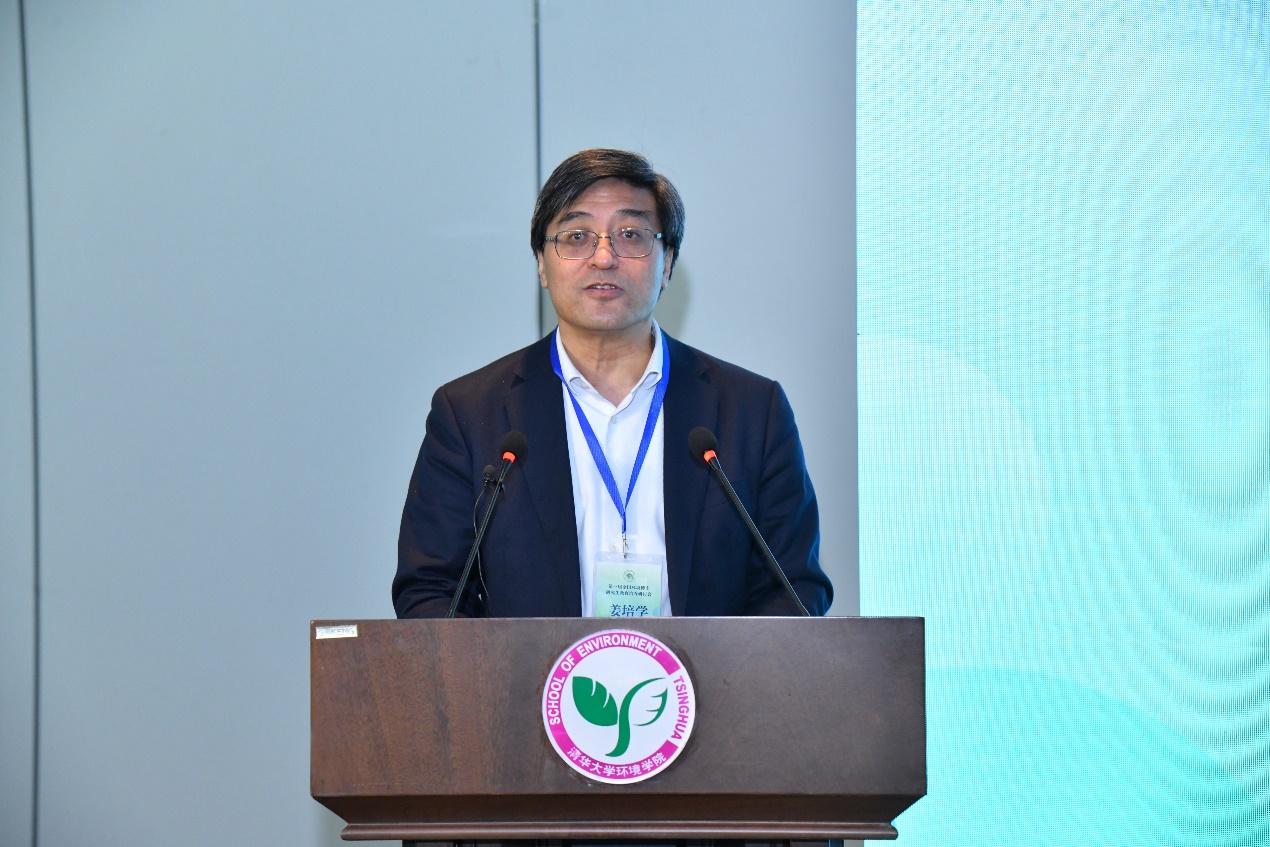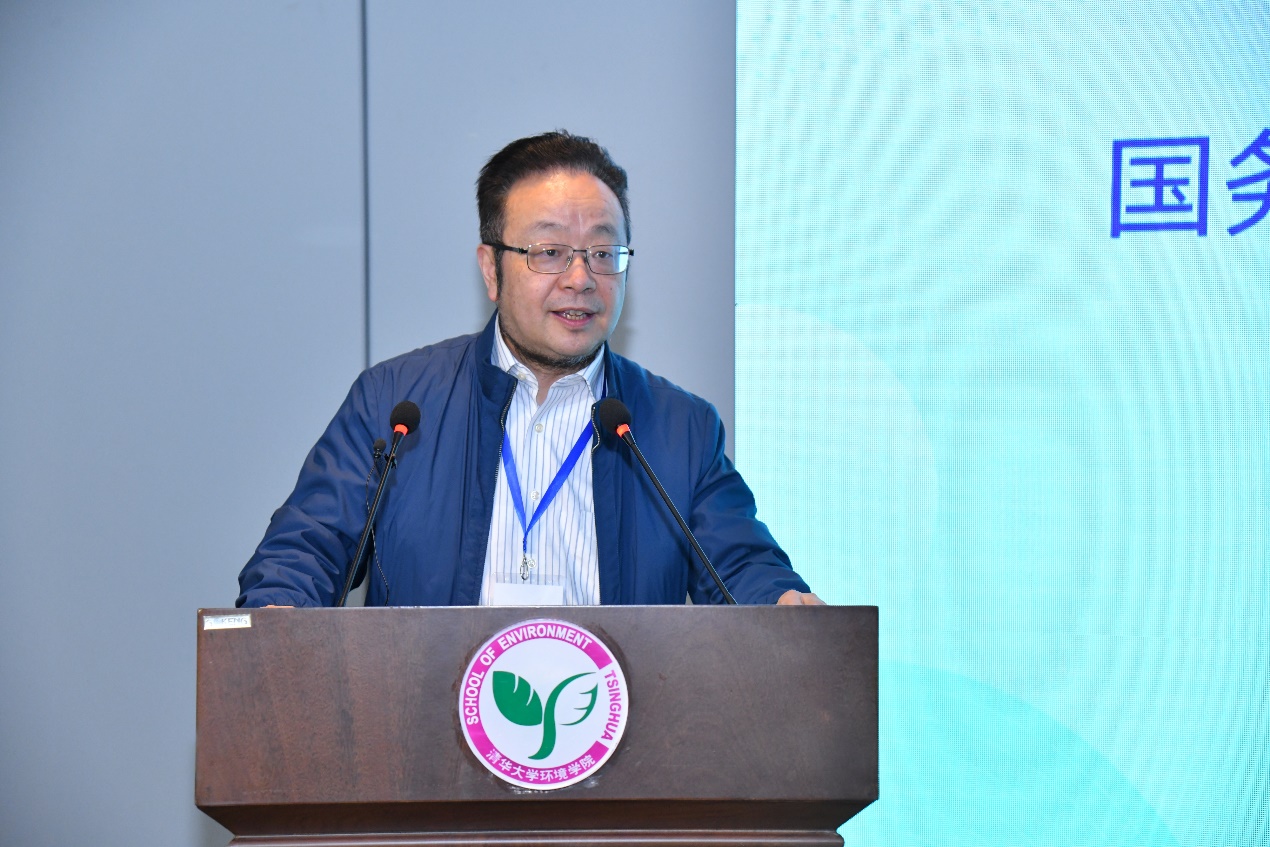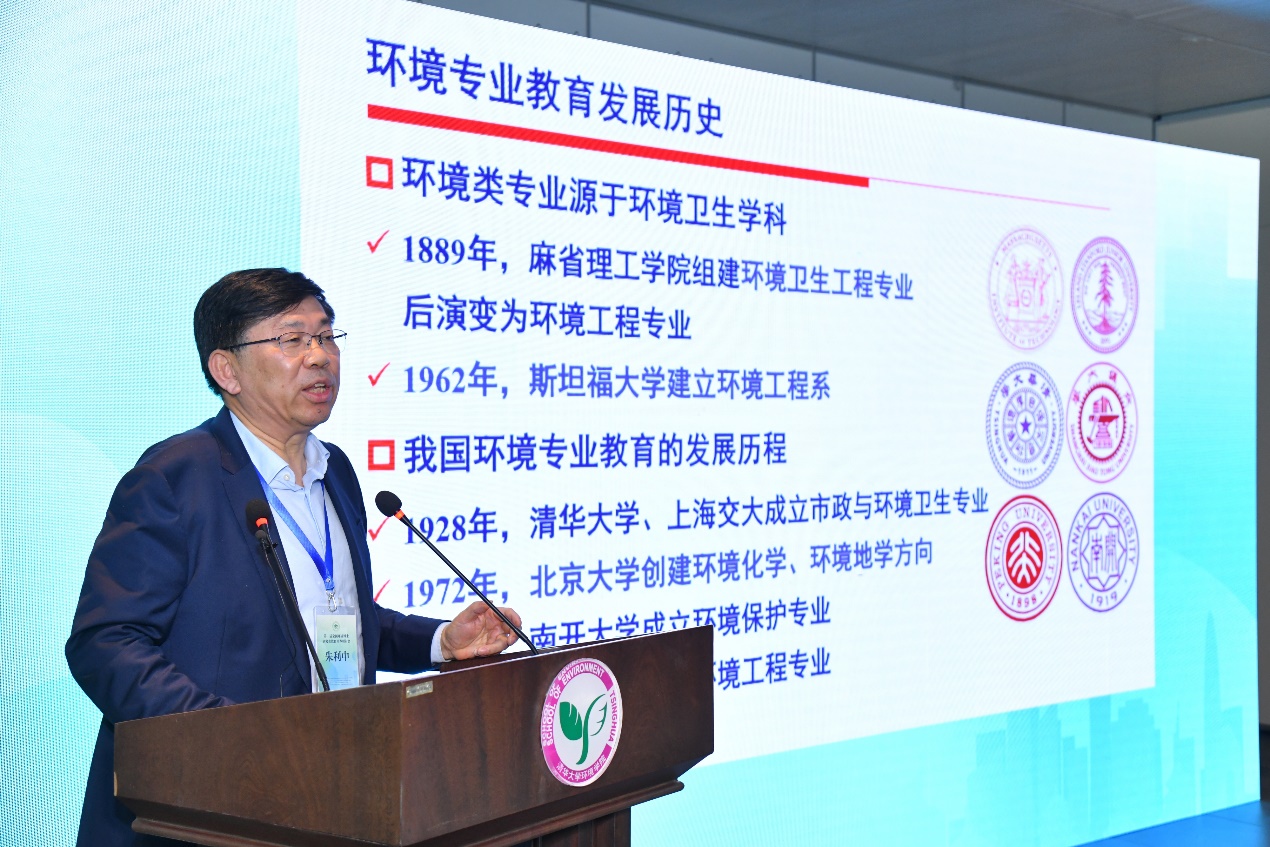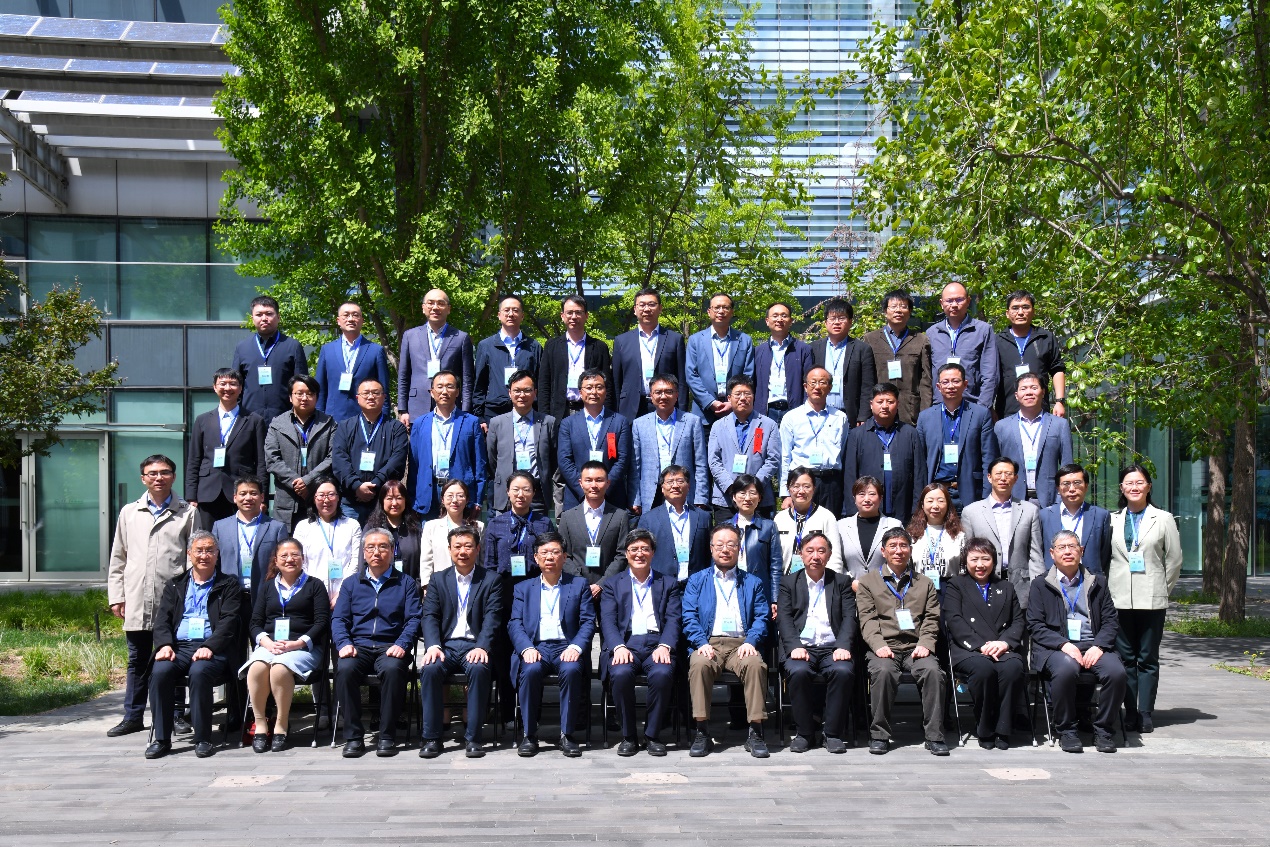On the afternoon of April 29th, the first National Seminar on Education and Cultivation of Environmental Doctoral Students was held at the School of Environment, Tsinghua University. The event was co-hosted by Tsinghua University, the Environmental Science and Engineering Discipline Evaluation Group of Department of Degree Management & Postgraduate Education (Office of the State Council Academic Degrees Committee), and the Chinese Society for Environmental Sciences (CSES). The seminar was organized by the School of Environment at Tsinghua University, College of Environmental & Resource Sciences of Zhejiang University, School of Environment, Harbin Institute of Technology, College of Environmental Sciences and Engineering at Peking University, College of Environmental Science and Engineering at Tongji University, the Environmental Education Committee and the Youth Scientists Branch of the Chinese Society for Environmental Sciences.
Vice President of Tsinghua University and Academician Jiang Peixue, convener of the Environmental Science and Engineering Discipline Evaluation Group of Department of Degree Management & Postgraduate Education (Office of the State Council Academic Degrees Committee), and Dean of the Institute for Carbon Neutrality at Tsinghua University, Academician He Kebin; convener of the Environmental Science and Engineering Discipline Evaluation Group of Department of Degree Management & Postgraduate Education (Office of the State Council Academic Degrees Committee), and Dean of Zhejiang Ecological Civilization Academy, Academician Zhu Lizhong; Associate Dean of the Graduate School of Tsinghua University, Wu Ye; Associate Dean of the National Outstanding Engineering Institute of Tsinghua University, Wang Renmo; Professors Cui Baoshan, Dai Xiaohu, Feng Yujie, Gao Huiwang, Jing Chuanyong, Tang Lin, Wang Peifang, and Yao Jun from the Environmental Science and Engineering Discipline Evaluation Group of Department of Degree Management & Postgraduate Education (Office of the State Council Academic Degrees Committee); Dean of the College of Environment and Ecology at Chongqing University, He Qiang; Vice Chairman of the School Council and Dean of the School of Environmental Science and Technology at Dalian University of Technology, Liu Meng; Dean of the School of Environment at Tsinghua University, Liu Yi; Dean of the College of Environmental Science and Engineering at Tongji University, Wang Zhiwei; along with more than 30 experts responsible for doctoral education and supervision of doctoral students from over 25 renowned universities and research institutes nationwide, gathered for a conference. The meeting, themed " Promoting Innovative Development in the Training of Environmental Ph.D. Students," aimed to summarize advanced experiences in environmental doctoral education and explore innovative models for doctoral student training. The seminar was chaired by Associate Dean Yue Dongbei of the School of Environment at Tsinghua University.
Jiang Peixue and He Kebin delivered speeches on behalf of the organizers, sincerely welcoming all experts and scholars to participate in this seminar and encouraging the delegates to actively communicate and build consensus.
Jiang Peixue said in his speech that, according to the report of the 20th National Congress of CPC, the harmonious coexistence of human and nature is listed as one of the five characteristics of Chinese path to modernization. This sets higher requirements for cultivating top-notch innovative talents in the field of the environment. Universities should accelerate the establishment and improvement of the system for the classified cultivation of doctoral students in the environmental field and intensify efforts to cultivate high-level applied specialists while continuing to foster high-level academic innovative talents.

Speech by Jiang Peixue
He Kebin emphasized in the speech that the cause of ecological civilization in the new era is progressing. To proactively serve the needs of the national green development strategy, postgraduate education in environmental disciplines should adapt to the time and the situation and actively promote the innovation and development of environmental doctoral postgraduate classification and training mode, improve the quality of professional degree postgraduate education, and cultivate high-level applied talents in environmental disciplines.

Speech by He Kebin
Zhu Lizhong made a keynote report on the topic of 'Some Thoughts on Graduate Education in Environmental Science and Engineering.' He highlighted issues in the postgraduate training of environmental science and engineering, such as the lack of basic theories in the discipline and insufficient characteristics of environmental specialties. He emphasized the need to strengthen in-depth education and addressed the saturation of postgraduate training in environmental specialties. In the context of the new era and facing the major needs of the Party and the country, graduate education in environmental science and engineering should accelerate the construction of first-class disciplines. This includes enriching the connotation of environmental disciplines, expanding professional directions like environmental health and environmental management, cultivating professionals tailored to regional development needs, optimizing and improving the curriculum system, course design, and textbook construction. The focus should also be on enhancing the training process management to improve the quality of talent training. Promoting the integration of industry and education is crucial, along with enhancing skills in innovation and entrepreneurship. The goal is to cultivate a group of high-level environmental talents who possess the knowledge, critical thinking, and practical skills necessary for addressing contemporary challenges.

Keynote presentation by Zhu Lizhong
During the conference, 10 representatives made theme reports on the cultivation of high-level talents in the field of environment. Liu Yi, Dean of the School of Environment at Tsinghua University, outlined the mode, system, and characteristics of training engineering doctoral students in the School. Wang Zhiwei, Dean of the College of Environmental Science and Engineering at Tongji University, discussed the cooperation foundation, development history, and cultivation effectiveness of Sino-German doctoral training in the environmental field. Xu Linyu, Associate Dean of the School of Environment at Beijing Normal University, provided a comparative overview of the cultivation objectives, enrollment methods, cultivation process, and degree requirements of different categories of doctoral students in the School. Zhang Haihan, Associate Dean of the School of Environmental and Municipal Engineering at Xi'an University of Architecture and Technology, presented the doctoral training mode of the school based on the ecological and environmental characteristics of Northwest China. Liu Wei, Associate Dean of the School of Environmental Science and Technology at Dalian University of Technology, discussed the doctoral training system, effectiveness, problems, and reform ideas of the School. Liu Wenbin, Associate Dean of the College of Resources and Environment at the University of Chinese Academy of Sciences, introduced the philosophy of 'integration of science and education,' teaching resources, and cultivation process of the school's postgraduate training. Wang Qi, Associate Dean of the College of Environmental Sciences and Engineering at Peking University, outlined the whole chain discipline system of 'Science-Engineering-Health-Management' and the development of the doctoral training system of the College. Feng Yujie, Dean of the School of Environment at Harbin Institute of Technology, discussed the reform process of postgraduate training and the training mode of professional degree students. Zhang Bing, Associate Dean of the School of Environment at Nanjing University, outlined the platform development of the School and its multi-chain support for academic, employment-oriented, and innovative graduate students. Liu Zhifeng, Assistant Dean of the College of Environmental Science and Engineering at Hunan University, discussed the teaching philosophy, historical heritage, graduate training practice, and effectiveness of the college.
This seminar deeply implements the spirit of General Secretary Xi Jinping's important instructions on postgraduate education, as well as the spirit of the National Education Conference and the National Conference on Postgraduate Education. It establishes an exchange platform for the cultivation of environmental doctoral students among universities and research institutes specializing in environmental studies across the country. The seminar aims to promote the development of environmental disciplines and the cultivation of high-level innovative talents. During the event, participants engaged in thorough discussions on topics such as the classification and training mode of doctoral students, the management of the entire doctoral education and training process, the assessment and evaluation mechanisms for innovative achievements and abilities, and the construction of the doctoral curriculum system for environmental disciplines. They summarized advanced education experiences and innovative training modes, collectively envisioning the future of innovation and development in doctoral education for environmental disciplines nationwide.

Group photo of the first National Seminar on Education and Cultivation of Environmental Doctoral Students





